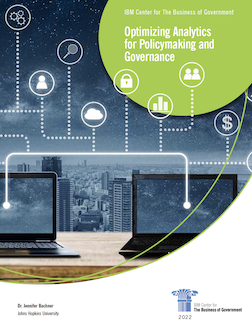
Optimizing Analytics for Policymaking and Governance

Review our infographic of the report.
This approach is emphasized in legislation such as the Foundations for Evidence-Based Policymaking Act codified in January of 2019.
This legislation requires that federal agencies develop “learning agendas” that are tied to the strategic plan of the organization and demonstrate, through the use of data and data analytics or “evidence,” that the mission programs are delivering results and the impact is as originally intended. In addition, the legislation also requires that a data analytics capability be established within the agency under the purview of a chief data officer to execute this responsibility.
As a supporting mechanism for the effective use of data within the federal government, the Office of Management and Budget released on June 4th, 2019, the Data Strategy Memorandum M-19-18, Federal Data Strategy—A Framework for Consistency, which provided a mission statement, principles, and practices to provide a governmentwide vision for how agencies should manage and use federal data by 2030. Federal agencies have since made progress against these goals and are still in the process of maturing their effective use of data analytics in policymaking and governance.
In this report, Jennifer Bachner has derived conclusions regarding agency progress based on a systematic review of these efforts. This review draws on a survey of professionals working in and with federal agencies to develop a more comprehensive understanding of how the government uses analytics, the outcomes of these efforts, and the challenges agencies face in their work to further develop analytical capabilities. The survey was first conducted in June of 2019 and again in August of 2021.
After each iteration, a forum with a panel of experts discussed the findings. The results show that the federal government has made substantial progress and the report highlights those successes and provides examples of effective implementations. The report also provides insight into the challenges ahead and key areas of focus and success factors necessary for continued improvement.
The timely release of this report coincides with the recent agency posting of their learning agendas on Evaluation.gov. And the report builds on recent Center studies involving data and analytics, including Using Data and Analytics to Enhance Stakeholder Engagement in Environmental Decision-Making, Aligning Open Data, Open Source, and Hybrid Cloud Adoption in Government, Making Federal Agencies Learning-Based: The Key Role of Learning Agendas, and Silo Busting: The Challenges and Successes of Intergovernmental Data Sharing.
We hope that this report facilitates the continued conversation around the importance of data analytics in designing and measuring federal programs and ensuring these programs are delivering value and impact for American citizens.



